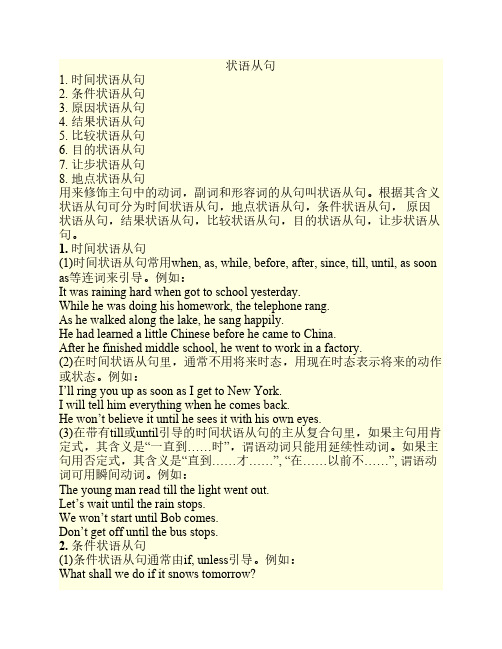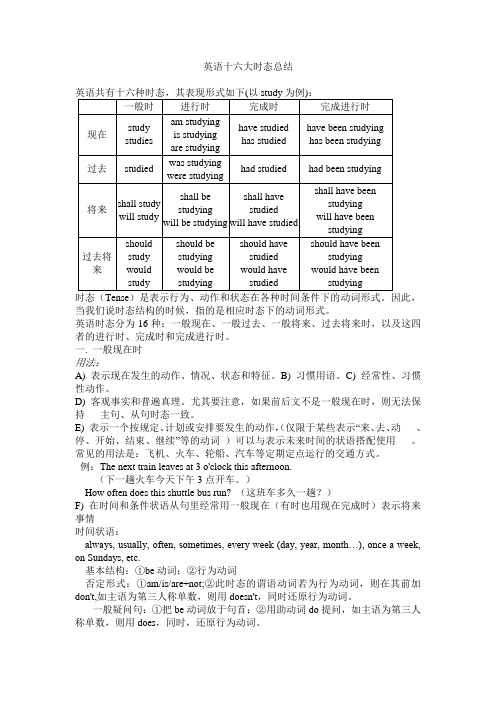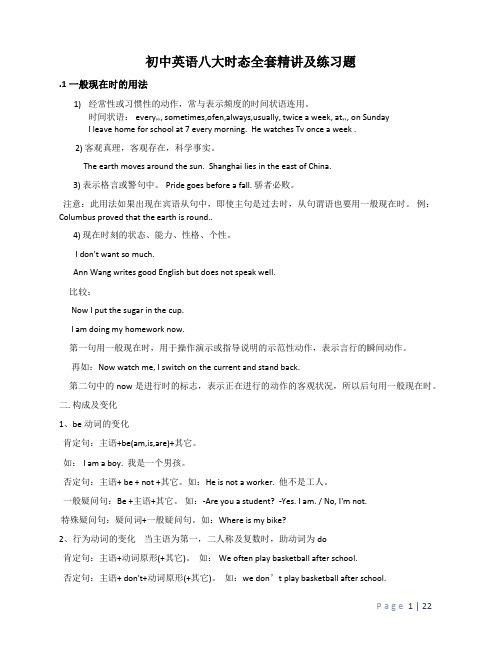各种时态地时间状语及练习
初中英语 八大时态详解练习

初中英语50个必考句型+ 八大时态结构必背句型句型1:There+be +主语+地点状语/ 时间状语There're three books on the table.桌子上有三本书。
句型2:What's wrong with+sb. / sth.? What's wrong with your telephone?你的手机有什么毛病?句型3:How do you like…?How do you like China?你觉得中国怎么样?句型4:What do you like about…?What do you like about China?你喜欢中国的什么?句型5:had better(not)+动词原形You'd better ask that policeman over there.你最好去问问那边的那个警察。
句型7:Thank+sb.+for (doing) sth. Thank you for coming to see me.感谢你来看我。
句型8:So+be / 情态动词/ 助动词+主语He is a student. So am I.他是一个学生,我也是。
句型9:not…until…He didn't have supper until his parents came back.直到他的父母回来他才吃饭。
句型10:比较级十and+比较级The baby cried harder and harder.那孩子哭得越来越厉害。
句型11:the+比较级,the+比较级The more one has, the more one wants.拥有的越多,想要的越多。
句型12:…as+adj. / adv.+as……not as(so)+adj. / adv.+as…Last Sunday the weather was not so wet as it is today.上个星期天的天气不如今天的天气潮湿。
时间状语从句讲解和练习(答案)

时间状语从句用句子表达一件事情或一个行为发生的时间,这个句子就叫时间状语从句。
时间状语从句根据其所表示的时间不同,所使用的连词也不同。
下面我们一起来看一下几个常见的时间状语从句:1.when引导的从句:表示主句的动作和从句的动作同时发生,或从句的动作发生在主句动作之前。
例如:I was going out when a visitor came. (动词动作同时发生。
)我正要出门,有客人来访。
I shall tell her the good news when she comes.她来时,我将告诉她这个好消息。
小试牛刀:I found mother cooking for me. I got home.(when)_______________________________________ He was listening to the radio when I home. (get)2.while 引导的从句:表示“当……过程中”,强调某一段时间内主句和从句中谓语动词所表示的动作在同一时期发生。
由于while从句表示一个持续的行为,所以从句中要用持续性动词,并且持续性动词常用进行时态。
例如:Keep an eye on my little sister while I am away.我不在时,请照看一下我的小妹妹。
While we were watching TV, Jim came in. 我们看电视的时候,Jim进来了。
小试牛刀:It started to rain. We were playing football.(while)_______________________________________ Lucy was cleaning the room Lily was listening to music.3.as引导的时间状语从句:表示“当……的时候;一边……一边……;随着……”,其从句的主语与主句的主语往往是同一人或物。
初中状语从句总结及练习(附答案)

状语从句1. 时间状语从句2. 条件状语从句3. 原因状语从句4. 结果状语从句5. 比较状语从句6. 目的状语从句7. 让步状语从句8. 地点状语从句用来修饰主句中的动词,副词和形容词的从句叫状语从句。
根据其含义状语从句可分为时间状语从句,地点状语从句,条件状语从句,原因状语从句,结果状语从句,比较状语从句,目的状语从句,让步状语从句。
1. 时间状语从句(1)时间状语从句常用when, as, while, before, after, since, till, until, as soon as等连词来引导。
例如:It was raining hard when got to school yesterday.While he was doing his homework, the telephone rang.As he walked along the lake, he sang happily.He had learned a little Chinese before he came to China.After he finished middle school, he went to work in a factory.(2)在时间状语从句里,通常不用将来时态,用现在时态表示将来的动作或状态。
例如:I’ll ring you up as soon as I get to New York.I will tell him everything when he comes back.He won’t believe it until he sees it with his own eyes.(3)在带有till或until引导的时间状语从句的主从复合句里,如果主句用肯定式,其含义是“一直到……时”,谓语动词只能用延续性动词。
如果主句用否定式,其含义是“直到……才……”, “在……以前不……”, 谓语动词可用瞬间动词。
初中英语时态讲解及练习(全)

时间状语:Tomorrow, next day(week, month, year…),soon, in a few minutes, by…,the day after tomorrow, etc.
否定形式:主语+am/is/are not going to do ; 主语+will/shall not do+其他 一般疑问句:be放于句首;will/shall提到句首。
1.I ____(write, am writing, is writing, are writing) a letter now. 2.Look, it _____(begin, is beginning, am beginning, are beginning) to rain. 3.They ____(study, is studying, am studying, are studying) medicine at the Medical Institute of Chengde these days. 4.He _____(teach, am teaching, is teaching, are teaching) an English lesson at this time.
谓语动词使用过去式形式, 加ed,分为规则和不规则变 化。表示过去经常发生的动 作,也可用“used to do ” 和“would +动词原形”。
1. He____(be, was, were, been) here a moment ago. 2. They ____(be, was, were, been) here just now. 3. The scientists _____(leave, leaves, leaved, left) for America yesterday. 4. Last week we ______(visit, visited ) the Science Museum. 5. When I was a child, I often ____(play, played) football. 6. The students ran out of the classroom as soon as the bell ____(ring, rang, rung).
英语十六大时态总结及相关练习题

英语十六大时态总结当我们说时态结构的时候,指的是相应时态下的动词形式。
英语时态分为16种:一般现在、一般过去、一般将来、过去将来时,以及这四者的进行时、完成时和完成进行时。
一. 一般现在时用法:A) 表示现在发生的动作、情况、状态和特征。
B) 习惯用语。
C) 经常性、习惯性动作。
D) 客观事实和普遍真理。
尤其要注意,如果前后文不是一般现在时,则无法保持主句、从句时态一致。
E) 表示一个按规定、计划或安排要发生的动作,(仅限于某些表示“来、去、动、停、开始、结束、继续”等的动词)可以与表示未来时间的状语搭配使用。
常见的用法是:飞机、火车、轮船、汽车等定期定点运行的交通方式。
例:The next train leaves at 3 o'clock this afternoon.(下一趟火车今天下午3点开车。
)How often does this shuttle bus run? (这班车多久一趟?)F) 在时间和条件状语从句里经常用一般现在(有时也用现在完成时)表示将来事情时间状语:always, usually, often, sometimes, every week (day, year, month…), once a week, on Sundays, etc.基本结构:①be动词;②行为动词否定形式:①am/is/are+not;②此时态的谓语动词若为行为动词,则在其前加don't,如主语为第三人称单数,则用doesn't,同时还原行为动词。
一般疑问句:①把be动词放于句首;②用助动词do提问,如主语为第三人称单数,则用does,同时,还原行为动词。
二. 一般过去时用法:A) 表示过去某个时间发生的动作或情况。
B) 表示过去习惯性动作。
特别是由would/ used to do表达的句型,本身表示的就是过去时。
He used to visit his mother once a week.(他以前总是每周看望一次他的母亲。
英语八种时态的标志词以及时态的练习

几种时态的标志词;一、一般现在时:always, usually, often, sometimes, every week (day, year, month…), once a week, on Sundays。
二、一般过去时:ago, yesterday, the day before yesterday, last week(year, night, month…), in 1989, just now, at the age of 5, one day, long long ago, once upon a time, etc.三、一般将来时:tomorrow, next day(week, month, year…),soon, in a few minutes, the day after tomorrow, etc.四、现在进行时:now, at this time, these days, at present, at the moment,etc.五、过去进行时:at this time yesterday, at that time或以when引导的谓语动词是一般过去时的时间状语等。
六、现在完成时:a.表示说话前发生过一次或多次的动作,现在成为一种经验,一般译为汉语“过”,常带有twice, ever, never, three times等时间状语。
b. 用副词already和yet。
already一般用于肯定句中,yet一般用于否定句和疑问句中。
如:We have already finished our homework.我们已完成作业了。
c.用ever和never。
多用于否定或疑问句中,表示“曾经”或“从未“等。
如:-Have you ever been to the Great Wall?你曾经去过长城吗?d.用表示到说话为止的过去时间状语,如just, before, up to now, the past few years /so far/in the last few years/until now/by the time等e.表示从过去某一时刻开始一直持续到现在的动作或状态。
高中英语时态及练习

高中英语时态及练习一、一般现在时1、表示现在发生的动作或存在的状态,常与every day,once a week,in the morning,at present等连用。
例:They don’t usually have enough money to go to the movies.2、表示主语具备的性格和能力等。
例:Mary can speak three languages.3、表示经常性或习惯性的动作,常与always,never,sometimes,often等连用。
例:I never eat fast food.4、表示现在提出的建议或要求。
例:Could you please help me with my math homework?二、现在进行时1、表示正在发生的动作或存在的状态。
例:He is studying for his history exam.2、表示现阶段正在进行的动作,但这个动作不一定正在进行。
例:My brother is preparing for his college entrance exams.3、表示即将发生的动作,常与表示将来的时间副词连用。
例:We are about to start our journey.三、现在完成时1、表示过去发生的动作对现在造成的结果。
例:I have just finished my homework.2、表示过去开始一直持续到现在的动作或状态,并可能继续下去。
例:They have been married for 20 years.四、一般过去时1、表示过去某个时间发生的动作或存在的状态。
例:We saw a movie last night.2、表示过去经常或反复发生的动作。
例:He always went to the park in the morning.高中英语时态练习英语时态是英语语法中非常重要的一个部分,也是我们在学习英语过程中必须要掌握的知识。
初中英语八大时态全套精讲及练习题(附答案)

初中英语八大时态全套精讲及练习题.1 一般现在时的用法1)经常性或习惯性的动作,常与表示频度的时间状语连用。
时间状语: every…, sometimes,ofen,always,usually, twice a week, at…, on SundayI leave home for school at 7 every morning. He watches Tv once a week .2) 客观真理,客观存在,科学事实。
The earth moves around the sun. Shanghai lies in the east of China.3) 表示格言或警句中。
Pride goes before a fall. 骄者必败。
注意:此用法如果出现在宾语从句中,即使主句是过去时,从句谓语也要用一般现在时。
例:Columbus proved that the earth is round..4) 现在时刻的状态、能力、性格、个性。
I don't want so much.Ann Wang writes good English but does not speak well.比较:Now I put the sugar in the cup.I am doing my homework now.第一句用一般现在时,用于操作演示或指导说明的示范性动作,表示言行的瞬间动作。
再如:Now watch me, I switch on the current and stand back.第二句中的now是进行时的标志,表示正在进行的动作的客观状况,所以后句用一般现在时。
二. 构成及变化1、be动词的变化肯定句:主语+be(am,is,are)+其它。
如: I am a boy. 我是一个男孩。
否定句:主语+ be + not +其它。
如:He is not a worker. 他不是工人。
- 1、下载文档前请自行甄别文档内容的完整性,平台不提供额外的编辑、内容补充、找答案等附加服务。
- 2、"仅部分预览"的文档,不可在线预览部分如存在完整性等问题,可反馈申请退款(可完整预览的文档不适用该条件!)。
- 3、如文档侵犯您的权益,请联系客服反馈,我们会尽快为您处理(人工客服工作时间:9:00-18:30)。
与各种时态连用的时间状语一、常与一般现在时连用的时间状语:1、副词:always often never sometimes usually2、短语:every day / week / month / year once a week hardly everevery ten minutes 每十分钟every other ten minutes 每隔十分钟now and then 不时from time to time 不时另:客观事实、客观真理只用一般现在时eg: He always stud ies very hard.They sometimes go to school on foot.Ken doesn’t clean his teeth every day.The No. 2 bus pass es here every fifteen minutes.Do you visit your uncle now and then?二、常与一般过去时连用的时间状语:1、副词:yesterday2、短语:last week / month / year / night last Mondayyesterday morning / afternoon / evening last Mayjust now = a moment ago two days agothe day before yesterday the other day 前几天in (已过去的)某年/ 月on (已过去的)某天at (已过去的)几点钟与某些从句连用eg: He always stud ied hard last year.Mr. Smith came to see our teacher yesterday afternoon.Did you meet him the other day?They left here at 8:00.Andrew’s father went to Australia in 1978.He went to sleep after he finished his homework.I didn’t hear from him a week ago.The sports meet began on September 20.三、常与现在完成时( has / have done )连用的时间状语:1、副词:already yet just ever before never recently2、短语:how long for + 一段时间these five years by far so farsince + 时间点how many times in these / those days 次数eg: He has lived in Sydney since 1986.They have arrived here two days before. 比较:They arrived here two days ago.I have ever been to Guangzhou but I have never been to HK.Have you found one yet?Anne hasn’t lived here for four months.How long have you worked as a doctor?四、常与现在进行时( is / am / are doing )连用的时间状语:1、副词:now2、某些警示性动词如:look listeneg: Look! They are playing football.He isn’t reading English now.五、常与过去进行时( was / were doing )连用的时间状语:at this / that time yesterday;at 10:00 last night; from 7:00 to 8:00 yesterday morning; when / while 从句eg: I was doing my homework at this time yesterday evening.Were you watching TV at 8:00 p.m. last Friday?He wasn’t doing his sums when I came to his house.They watched me while I was making a cake.六、常与一般将来时( will / shall / be going to do )连用的时间状语:1、副词:tomorrow2、短语:next Sunday / week / month / year how soonin + 时间段/ (将来的) 某年/ 月after + 时间点on (将来的) 某天in the futureeg: We will have an English Evening tomorrow.He’ll be back in two hours.Our school will build another library in 2004.Tom will leave for Beijing after 9: 00 o’clock.at 9: 00 o’clock.How soon will you write to Anne?She will be ten years old on Saturday next week.七、常与过去完成时(had done)连用的时间状语:by the end of last…; before / after 从句;by yesterday / last Monday宾语从句八、现在完成时与一般过去时、一般现在时的区别:现在完成时强调的是动作虽发生或开始在过去,但跟现在有联系一般过去时则强调A)过去某一具体动作,可配过去的具体时间B)过去某一时间内经常发生的动作一般现在时强调现在时间内经常发生的动作或客观事实e.g.: I have done all my homework.I did my homework last night.I often did my homework before dinner last month.I often do my homework before dinner.He works as an engineer in a company.It never snows in Hainan Island.EXERCISES:I.Fill in the blanks with the proper forms of the following words:1.Mary usually _____________ (get) up early in the morning.2.We _________ already ____________ ( have ) supper.3.I ____________________ (call) him in half an hour.4.Sue ______________________ ( not do ) any washing last year.5.Listen! Someone _________________________ (knock) at the door.6.They _________________________ (swim) in the river at this time yesterday.7.He ________________________ (not book) the court yet.8.Lucy and Lily ______________________ (not come) to my party tomorrow evening.9.My pencil ______________ (break) while I ______________________ (draw) a horse.10.They _____________________ (play) football when I ___________ (see) them.11.He told the child that the sun ____________ ( go ) down in the west.12.What will he be when he _____________ (grow) up?13.We won’t begin our work until he ___________ (come).14.Sue __________________ (join) the match of next July.15.How long ______________ he ____________ (arrive) at the station?16.How soon __________ he ____________ (arrive)?17.My father ________________ (work) as a doctor ten years ago.18.He never ____________ (tell) a lie when he ___________ (be) a child.19.Sometimes last year, my parents ____________ (come) home very late.20.The baby ______________ (drink) water every two hours.21.He ________________ (call) me every other twenty minutes yesterday.22.It _______________ (snow) heavily on the morning of last Saturday.23.By the end of last year, they ___________________ (write) five songs.24.He ___________ just _____________ (draw) a map.25.They _______________________ (not hand) in their homework the other day.26.He _________________________ (not come) here since last month.27.Next week, I _______________________ (stay) with my aunt for two days.28.Peter and Tim _____________________________ (not have) class at nine yesterday.29.I _________________________ (return) you the book in three days.30.Look! They ____________________________ (not clean) the windows at all!II.Multiple choice:1.What _____ you ______ at this time last Sunday?A. did...doB. have...doneC. were...doingD. are...doing2.He said the train ______ faster than any man.A. runB. runsC. ranD. is running3.How long ___ he ____ in Shenzhen?A. eB. has...arrivedC. will...reachD. has...been4.Many people often _____ rice for supper in south China.A. haveB. hasC. hadD. are having5.She ___ always ___ angry with nothing.A. is...beingB. will...beC. is.../D. /...is6.I didn’t know a word of English until I ____ here.A. cameB. have comeC. had comeD. was coming7.I ____ you about that many times.A. toldB. tellC. have toldD. am telling8.Water _____ at 100 0 C.A. boilsB. is boilingC. has boiledD. boiled9.Ken ___ up at 6:30 in the morning.A. gotB. getC. getsD. is getting10.How many English words ____ you _____?A. do...learnB. has...learnedC. have...learnedD. will...learn11.I ____ him just now.A. seeB. sawC. have seenD. am seeing12.He ____ his best to learn English well.A. doesn’tB. hasn’t doneC. doD. doesn’t do13.Her new shoes _______ under the bed.A. isB. areC. wasD. am14.Where ____ you _____? I’ve looked for you the whole mor ning.A. have...goneB. did...go toC. are...goingD. have...been15.I ____ him but I ____ to him.A.see...didn’t speakB. saw...spokeC. have seen...haven’t spokenD. saw...didn’t speak英语时态综合练习(一)一、用所给词的适当形式填空:1.He______swimming in the river every day in summer. (go)2.It________you are right. ( seem )3.Look, the children______ basketball on the playground. ( play )4.He______to the radio when I came in, ( listen )5.It is very cold .I think it______ . ( rain )6. I need some paper . I______ some for you . ( bring )7.I cant find my pen . Who______it ? ( take )8.He said that he______back in five minutes . ( come )9.I didnt meet him. He______ when I got there. ( leave )10.I______my bike, so I have to walk to school. ( lose )11.He______down and began to read his newspaper. ( sit )12.He is very hungry. He_________ anything for three days. ( not eat )13.I______with you if I have time . ( go )14.We will go to the cinema if it______fine . (be )15.I will tell her the news when she______to see me next week. (come)16. When______you______the car ? In 1998 . ( buy )17.We______good friends since we met at school . (be)18.What______you______ at five yesterday afternoon ? (do)19.The bike is nice . How much______it______? (cost)二、选择最佳答案填空()1.Well go swimming if the weather______fine tomorrow.A. isB.wasC. will beD.is going to be()2.It______five years since he has left for Beijing.A. wasB. has beenC.isD.is going to be()3.Please dont leave the office until your friend______back.A.cameesC.have comeD.will come()4.By the end of last year he______about 1500 English words.A. learnsB.learnedC.was learningD.had learned()5.Listen ! Someone______in the next room .A.criedB.cryingC.is cryingD.has cried()6.You must tell him the news as soon as you______him.A.seeB.seesC.will seeD.is seeing()7.He told me that he______to see us the next day.esB. cameC. will comeD. would come()8.We cant find him anywhere . Perhaps he______home.A. is goingB. wentC. has comeD. would come()9.The teacher told us that the sun______bigger than the earth.A. isB. wasC. has beenD.will be()10.Could you tell me where the railway station______?A. wasB. isC. will beD. would be()11.We______to the Great Wall several times.A. goB. were goingC. have goneD.have been()12.It seemed that the old man______for something over there.A. looksB. lookedC. was lookingD. has looked()13.He was sure that he______his wallet in the office .A. leftB. would leaveC. had leftD. has left()14.You must study hard if you______ want to fail the exam.A. wontB. dontC. haventD. hadnt()15. Im afraid you cant sit here . Sorry , I______know.A. dontB. wontC. cantD. didnt()16. As she______the newspaper , Granny______asleep.A. read , was fallingB. was reading fellC. was reading , was fallingD.read , fell ()17. Jim is not coming tonight . But he______ !A. promises(许诺)B. promisedC. will promiseD. had promised()18. Whats her name? I______.A. forgetB. forgotC. had forgottenD. am forgetting三、动词时态能力综合测试()1.He often______his clothes on Sundays.A. washingB. washesC. has washedD. wash()2.Im Chinese. Where______from?A. do you comeB. you are comingC. you comeD. are you coming()3.May______to school.A. never walksB. is never walkingC. walk neverD. never is walking ()4.We will start as soon as our teacher______ .A. comesB. will comeC. comeD. is coming()5.How long ago______playing football?A. have you stoppedB. had you stoppedC. did you stopD. do you stop ()6.It______ hard when I left my house .A. is rainingB. rainsC. was rainingD. will rain()7.I think this question______to answer.A. easyB. is easyC. was easyD. will easy()8. Dont talk so loudly . Your father______.A. sleepsB. is sleepingC. sleptD. had slept()9.How many people does the doctor know who______of the disease (疾病)?A. are dyingB. is dyingC. has diedD. dies ()10.I______my homework now.A. finishB. finishedC. have finishedD. had finished ()11.He______for three years.A. has joinedB. has been in the armyC. joinedD. has served the army ()12.His grandfather______for thirty years.A. diedB. was deadC. has been deadD. has died()13.I______ from my brother for a long time.A. not have heardB. have not heardC. have heard notD. do not hear ()14.Maths, one of the most important subjects, ______always interested him.A. hasB. haveC. areD. is()15.Did your brother go to America last year? ______.A. No , he did never go thereB. No , he has never gone hereC. No , he never was thereD. No , he has never been there()16.He______ that factory since 1958.A. has leftB. has worked inC. has gone fromD. has come to ()17.Our teacher______to Beijing three times.A. wentB. had goneC. has goneD. has been()st week John______his leg.A. felt and brokenB. fell and brokeC. feels and breaksD. fallen and broken ()19.Jack______his thick coat because it was snowing.A. puts onB. put onC. takes onD. took on()20.He______the picture on the wall.A. hangedB. hungC. has hangedD. was hanged()21.Next month______twenty five.A. has my sisterB. my sister will beC. my sister shall haveD. my sister is going to be ()22.You______her again in a few weeks.A. will seeB. have seenC. had seenD. have been seen()23. By the end of last term we______English for two years.A. have studiedB. have been studiedC. would studiedD. had studied()24.Mrs Brown______in New York for three years before she went to London.A. livedB. had livedC. has livedD. will live()25.When we arrived , the dinner______.A. already beganB. has already begunC. had already begunD. was just begun()26.I will go home for the holiday as soon as I______ my exams.A. will finishB. finishC. finishingD. finished()27.When______, Ill talk to him.A. does Peter comeB. Peter will comeC. Peter comesD. can Peter come()28.My sister______to see me . Shell be here soon.A. comesB. is comingC. had comeD. came()29.They said they______our answer the next day .A. had heardB. would hear ofC. would hearD. will hear()30.The old man said that light______faster than sound.A. wentB. will goC. travelsD. will travel动词时态专项训练(答案)一、1.goes 2. seems 3. are playing 4. was listening 5.will rain 6. will bring7. took 8. would come 9. has left 10.lost 11. sat 12. hasn't eaten 13. will go 14. is 15. comes 16. did buy 17. have been 18. were doing 19. does cost二、1. A 2. B 3. B 4. D 5. C 6. A 7. D 8. C 9. A 10. B 11. D 12. C13. C 14. B 15. A16.A17.B18.A三、1. B 2. A 3. A 4. A 5. C 6. C 7. B 8. B9. A 10. C 11. B 12. C 13. B 14.D 15. D 16. B 17. D 18.B 19. B 20. B 21. B 22.A 23. D 24. B 25. C 26. B27. C 28. B 29. C 30.C。
